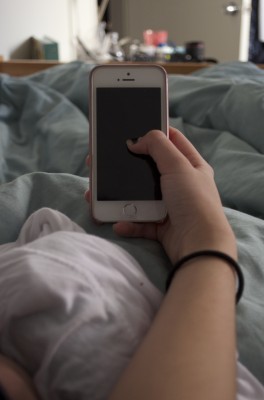Smartphone Usage Making Us Not So Smart
March 11, 2015
Smartphones have allowed us to keep minicomputers in our pockets and have connected us to the world and to each other.
Elana Tee, Fordham College at Lincoln Center (FCLC) ’17, said, “Instagram and Twitter used to take up so much time, but ever since I’ve deleted those apps, I’ve spent significantly less time looking at my phone.”
A recent study at Baylor University found that college students are becoming addicted to their cellphones. In terms of usage, the study claims that female students use their phones for an average of 10 hours per day and male students use their phones for an average of eight hours per day and both of which are potentially detrimental to the students’ academics. The study found that the most time consuming activity was texting, which consumed about 94.6 minutes, followed by sending emails and checking Facebook.
Euphoria is one of the six signs of cellphone addiction as identified by one of the authors of the study, Dr. James Roberts. Euphoria is described as the pleasurable feeling one gets from receiving a cellphone notification. Text messaging and emailing take up the most time and possibly make up the majority of notifications. Social media is another potentially large source of notifications.
With so much time spent on cellphones, it is not surprising that some people have found cellphones as a distraction and nuisance when it comes to academics. Gary Chen, FCLC ’15, said, “It’s tough to focus when your phone is constantly buzzing, [because] we have a tendency to answer it.” The constant connection to the internet that cellphones provide can be distractions that pull students’ focus away from their studies.
There is also a limit to how much a cellphone can contribute to one’s studies. Katherine Tracy, Gabelli School of Business at Lincoln Center (GSBLC) ’18, said that cellphones are “nowhere near as useful as a computer, because all of the distractions there are but everything that benefits you academically isn’t there.”
The capabilities of cellphones have increased, however, they are not equivalent to full sized computers. Although many apps, such as mobile versions of the Microsoft Office suite, allow for access to productive programs, the small screens and lack of a physical keyboard do not make them complete replacements of desktop versions. Many of these apps also lack many of the features available on their full sized counterparts.
The distractions are also an academic threat to classes. Dr. Heather Gautney, associate professor of sociology at FCLC, said, “We don’t meet in classrooms for very long. It’s only two and a half hours a week, so it’s a small concentrated time. It concerns me when students are unable to separate from their phones during that small window of time.”
However, there are supporters of cellphone use that find that they are imperative in today’s world. It may not be that users are necessarily addicted, but that the salience of cellphones in to our daily lives simply follows the new social norms.
Madeleine Haig, GSBLC ’18, said, “Your cellphone has become one of those forms of interaction. The same way that you’re addicted to different societal norms, having a cellphone and having it on you at all times is just a standard that society has established as necessary.” A lot of interpersonal communication is now done through technology and cellphones are a door to this technological age.
Cellular devices have also helped improve professional communication. Victoria Cleveland, GSBLC ’18, said, “It’s a disadvantage professionally, because most people expect that you have some email checking device where you can promptly check an email and promptly respond and if you don’t, that’s looked at as a lack of professionalism.”
Cellphones have become standard in some workplaces as a form of quick communication between employers and employees. The constant connection to the world is a necessity that modern cellphones provide to college students.
Cellphones also help with communication between professors and their students. Dr. Gautney, said, “Students contact me I can get back to them right away, I don’t have to be at home or here on my computer and so now I usually promise some of my classes that I’ll return emails within 24 hours … The kinds of communications you need to run a class are enabled by cellphone use.” Mobile apps, such as the Blackboard app for iOS devices allow students to access content and announcements posted by professors and, without using a desktop computer.
Gabriella York, FCLC ’17, thought, “Technology opens up a whole new world of education.”












